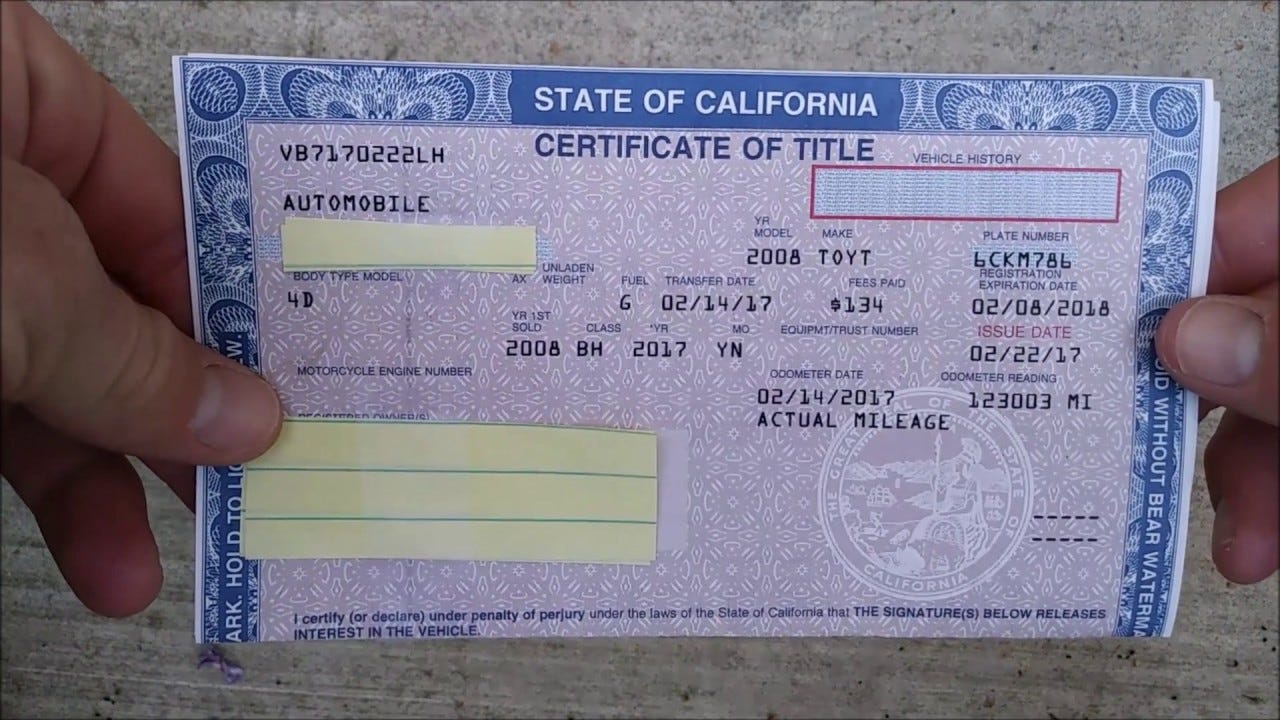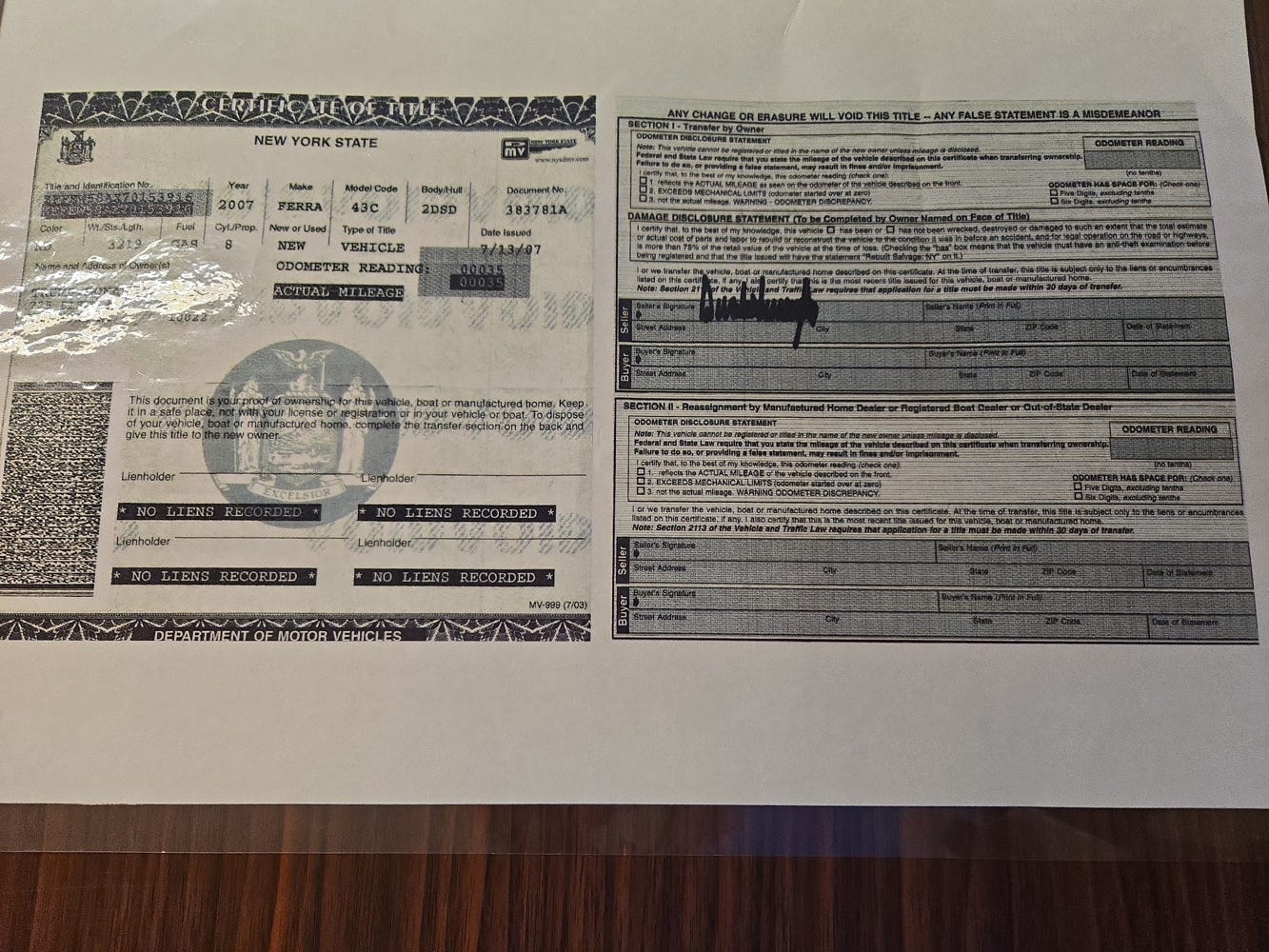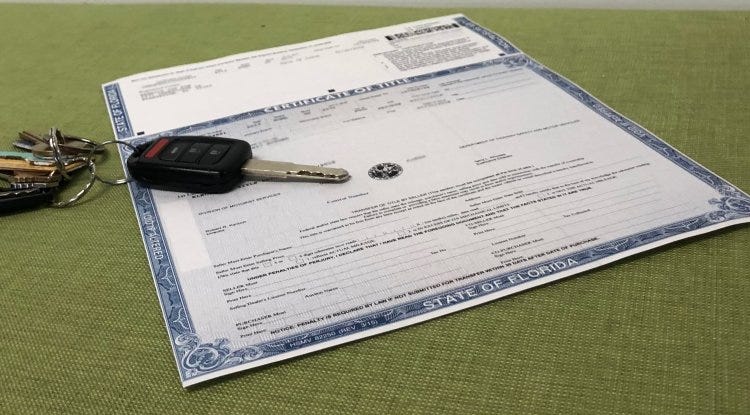- Get link
- X
- Other Apps
Everything About Car Title & Vehicle Registration You Need to Know
Imagine driving your dream car off the lot, the engine purring beneath you, the open road ahead. But then you hit a snag: you don’t have the Car Title, you’re missing the registration, and suddenly everything becomes complicated. Ownership, legal road use, insurance, transfer — it all hinges on these two documents.
- Vehicle & Fleet Ownership Services
- Benefits of Buying a Car with Clear Title
- Vehicle Registration Consulting & Compliance
- How to Title & Register an Imported Vehicle
Whether you’re buying your first vehicle, relocating internationally, selling a used car, or simply want to understand your rights: mastering the concepts of car title and vehicle registration is non-negotiable. In this article you’ll discover:
- What a car title really is and why every vehicle owner must care.
- What vehicle registration means and why you cannot drive legally without it.
- How these documents differ (and overlap) in the U.S. and globally.
- Practical step-by-step guides for obtaining, transferring, renewing, or replacing them.
- Common pitfalls, fraud risks, and how to protect yourself.
- Where the future of title and registration is evolving (digital, cross-border, smart vehicles).
By the end you’ll be empowered, informed, and ready to act — with confidence. Let’s dive in.
What Is a Car Title? (Vehicle Ownership Document)

Definition & Purpose of a Car Title
A car title — often called a “certificate of title”, “pink slip”, or simply “title document” — is the formal government-issued document that establishes you (or an entity) as the legal owner of a specific vehicle. Progressive+2Wikipedia+2
Key points:
- It lists the vehicle identification number (VIN), make, model, year, owner name and address. Car and Driver+1
- It may show liens (loans against the car) or other encumbrances. RateGenius
- It is typically required when selling, gifting, or transferring a vehicle to a new owner. Wheels For Wishes
- Without the correct title, you cannot legally prove ownership in most jurisdictions. Investopedia
Why the Car Title Matters
- Legal ownership: Only the person/entity named on the title is the legal owner (unless there are co-owners).
- Financial rights: Lenders hold the title as collateral until a loan is repaid; until then you often cannot fully transfer ownership. RateGenius
- Sell or transfer securely: When you sell your vehicle, you assign the title to the buyer — this ensures a clean transfer and protects both parties.
- Global recognition: While formats vary globally, nearly all countries require an ownership certificate analogous to a car title. Wikipedia+1
What Is Vehicle Registration? (Legal Road Use Certificate)

Definition & Purpose of Vehicle Registration
A vehicle registration links a vehicle to a registered owner (or keeper) and grants legal authorization to drive the vehicle on public roads. Policygenius+2dmv.virginia.gov+2
Important elements:
- It may consist of a certificate, registration number, license plates and sometimes a registration sticker. Policygenius
- It requires payment of fees/taxes, and often proof of insurance and/or inspection. SelectQuote+1
- It is renewable periodically (annually or every few years) rather than being a once-and-done document. Policygenius+1
Why Vehicle Registration Matters
- Legality: Driving an unregistered vehicle can incur fines, impoundment or legal liability. Policygenius
- Safety & compliance: Registration often ensures that inspection, tax and insurance requirements are met.
- Vehicle tracking & ownership link: The state uses registration records to link vehicles with owners for taxation, liability, law enforcement. Wikipedia
- Global equivalent: In many countries, vehicle registration is the primary document to certify that the vehicle meets regulatory requirements.
Car Title vs Vehicle Registration: How They Differ (and Why That Matters)

Key Differences in a Simple Diagram
(Diagram you can copy into your CMS or design platform):
CAR TITLE (Vehicle Ownership) | VEHICLE REGISTRATION (Legal Road Use) ----------------------------------------------|---------------------------------------------- Issued once when vehicle first titled | Issued/renewed periodically by state Shows legal owner’s name and lien info | Shows registered keeper, plates, tax paid Transfers when vehicle ownership changes | Remains valid as long as registration renewed Essential for sale/transfer | Essential for driving on public roads Not proof you can drive today | Proof you’re allowed to drive today
Why These Differences Matter
- When you buy a car, you need both documents: the title ensures you legally own it, the registration ensures you can legally drive it. Progressive
- If you only have the title but no registration, you may own the car but cannot legally drive it.
- If you only have the registration but the title is missing, you may not legally own it and could face complications when selling or transferring.
- International buyers and sellers often mis-understand these distinctions — leading to fraud or improper transfers. Reddit threads underscore this confusion: “The title is the ownership … the registration is the state tax on using the vehicle on public roads.” Reddit
How to Obtain a Car Title & Register Your Vehicle (U.S. Example)

Step-by-Step: First Title & Registration after Vehicle Purchase
Here’s a streamlined process many U.S. states follow (adapt as needed globally):
- Purchase the Vehicle — either from a dealer or private party. Obtain a bill of sale and the vehicle’s current title.
- Apply for Title — Submit the title transfer form, pay title fees, and provide proof of identity and residency. dmv.colorado.gov+1
- Register the Vehicle — Provide proof of ownership (title or proof of purchase), proof of insurance, payment of registration fees/taxes, and vehicle inspection if required. SelectQuote+1
- Receive Title & Certificate — Many states issue the title and registration certificate (and plates/tabs) together or in sequence.
- Keep Documents Safe — Title should be stored securely (not usually in vehicle); registration certificate and plates must often stay with the vehicle.
International & Global Notes
- In many countries, the equivalent of a car title and registration may be bundled or distinct. For example, the UK’s “V5C” log book is a registration document, not strictly an ownership title. Wikipedia
- If importing or exporting a vehicle, check both the ownership document and registration / tax status in both jurisdictions.
- When moving states or countries, you often must re-title or re-register in the new jurisdiction within a set timeframe. Policygenius+1
Common Issues, Fraud Risks & How to Protect Yourself

Red Flags to Watch For
- Title shows frequent transfers, salvage or rebuilt branding. Investopedia
- Registration certificate is expired, or plates don’t match the vehicle.
- Registered owner differs from title owner (especially in cross-border cases).
- Vehicle has outstanding liens — owner may not have full rights.
- Imported vehicle with insufficient registration documentation.
- Duplicate or forged title documents.
Best Practices for Protection
- Use a VIN history check (such as NMVTIS in the U.S.) to verify title and vehicle background. Wikipedia
- Verify the registration certificate in your jurisdiction’s database if possible.
- When buying used, ensure the original title is present and properly endorsed.
- When moving states, ensure you comply with the re‐registration and re‐title deadlines.
- Maintain secure storage of your original title, and keep copies of registration documents in the vehicle.
- Consult professionals or legal advisors if you’re dealing with cross‐jurisdiction ownership, imports, or unusual title branding.
Renewal, Transfer & Termination: What You Need to Know

Renewing Vehicle Registration
- Most states require registration renewal annually or every 1–2 years. Policygenius+1
- Renewal may require current insurance, safety inspection, emissions test, and payment of taxes/fees.
- Late renewal often triggers fines or suspension of driving privileges.
Transferring Title & Registration
- When you sell a vehicle: you must sign over the title to the buyer, and the buyer must register the car in their name. Progressive
- If you move to a new state, you often must title and register your vehicle within a specific timeframe (often 30–60 days). Policygenius
- When a lien is paid off, you can get a “clean title” (free of lienholder name).
- Some vehicles (e.g., imported, rebuilt) may require additional inspections before title/registration.
Ending Title/Registration (Vehicle Sale/Export/Scrapping)
- Upon export or scrap, you must surrender or notify your DMV/agency to terminate registration and transfer title.
- Failure to remove your name can lead to liability if the new owner operates illegally.
- Some jurisdictions issue branded titles like “salvage,” “rebuilt,” or “junk” — these cannot be removed in some states. Wikipedia
Global Perspective: Title & Registration Around the World

International Equivalents & Variations
- In many European countries, vehicle registration doubles as proof of ownership and is issued by national/regional authorities. Wikipedia
- Some countries issue separate ownership certificates and require annual road tax registration.
- Importing a vehicle often requires retitling in the destination jurisdiction, paying duties, emission compliance, and new registration.
- Language, legal terms and document formats differ — always verify local requirements.
Key Considerations for Global Owners or Expats
- If you live abroad and buy a car, check both title/ownership and registration rules in your country.
- When exporting a vehicle, ensure you have clear title from the origin country and understand the registration system in the destination country.
- For global businesses managing fleets, centralizing title and registration records helps compliance, taxation and disaster recovery.
Future Trends: Digital Titles, Smart Registration & Beyond

Digital Transformation in Title & Registration
- Many jurisdictions are shifting to electronic titles (e-titles) — paper documents replaceable by digital certificates. Investopedia
- Mobile registration apps allow renewal, plate replacement, and document storage online.
- Blockchain and secure databases may reduce fraud and streamline transfer of ownership globally.
- Vehicles with autonomous/self-driving capability may require new registration schemas based on software/firmware, not just VIN.
Impact on Owners & Businesses
- Faster transfers, reduced waiting time at DMVs or licensing offices.
- Lower fraud risk, greater transparency of vehicle history (clean titles, no hidden liens).
- Businesses with fleets benefit from automated registration/renewal tracking across jurisdictions.
- Data privacy and cybersecurity will become more important — secure handling of digital title/registration data is critical.
FAQ Section (Optimized for Featured Snippets)
Q1: What is the difference between a car title and vehicle registration?
A: A car title proves who legally owns the vehicle. Vehicle registration proves the vehicle is recorded with the state (or authority) and legally permitted to be driven on public roads. Wheels For Wishes+1
Q2: Do I need both a title and registration to drive legally?
A: Yes. You typically need registration to drive the vehicle. You need the title to prove ownership, transfer the vehicle, sell it, or get a loan. Without registration you cannot legally operate on public roads; without title you cannot prove ownership.
Q3: How often must I renew vehicle registration?
A: Renewal periods vary by jurisdiction (every year, every two years). The registration certificate must be current and fees/safety requirements met. Policygenius
Q4: What do I do if I lose my car title or registration?
A: Contact your local motor vehicle agency (DMV or equivalent). You’ll need to apply for a duplicate title or registration certificate and may need identification, proof of ownership, and pay a replacement fee.
Q5: Can I register a car in a different name than the title?
A: In some jurisdictions yes — but it creates risks. Ideally, the vehicle should be registered in the same name as the title owner, or you should have a lease/contract verifying legal use. Policygenius
Q6: What is a branded title and why should I avoid vehicles with one?
A: A branded title (e.g., salvage, rebuilt) indicates the vehicle was declared a total loss, heavily damaged, or reconstructed. It may affect value, resale, insurance, and registration eligibility. Investopedia
Q7: What happens if I move to another state or country with my vehicle?
A: You’ll likely have to re-title and re-register the vehicle within a set timeframe. The new jurisdiction will require proof of title, registration, insurance, and possibly inspection. Policygenius
Q8: Can I drive my car internationally with just a U.S. title and registration?
A: Not always. Driving abroad requires the destination country’s registration or import documentation and sometimes proof of export from your home country. You’ll usually need local registration to drive legally long-term.
Conclusion & Call-to-Action
Owning a vehicle is more than just driving it — it’s about ownership, legality, mobility and future-proofing. Your car title for sale and vehicle registration are the backbone of that ownership. They protect you, authenticate you, keep you compliant, and pave the way for global mobility.
At Elite Tech Tools, we help vehicle owners, buyers, sellers and fleet operators navigate the complex world of titles, registration, transfers and compliance with ease. Whether you’re in New York or beyond, our expertise ensures you never get caught with incomplete or improper documentation.
Ready to take control of your vehicle’s legal status? Contact us now for a FREE review of your title and registration status. Let us guide you to full compliance, seamless transfers and peace of mind — so you can focus on the road ahead.
👉 Schedule your consultation today and drive forward with confidence.
- Get link
- X
- Other Apps
Comments
Post a Comment